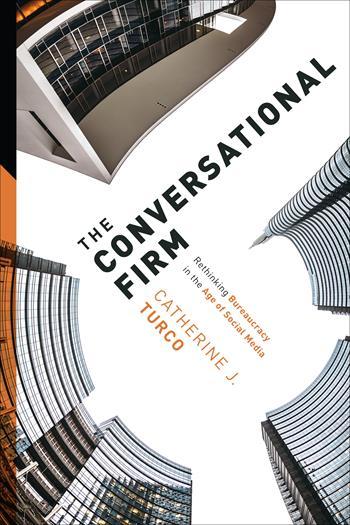In The Conversational Firm: Rethinking Bureaucracy in the Age of Social Media, Catherine J. Turco offers a ethnographic study of a fast-growing social media marketing company, anonymised as ‘TechCo’, that has sought to foster a different corporate culture through its use of social media to facilitate dialogue between employees across the hierarchy. The book offers an empathetic and nuanced understanding of the benefits and challenges of ‘the conversational firm’ that underscores the value of being seen to have a voice, whether in the workplace or the wider world, writes Michael Warren.
The Conversational Firm: Rethinking Bureaucracy in the Age of Social Media. Catherine J. Turco. Columbia University Press. 2016.
 ‘Empowered workforce’, ‘flat organisation structures’: we’ve all heard the empty buzzwords and latest fads to improve office productivity. When new initiatives are implemented there is often little change at the coalface for employees and minimal rewards to a company’s bottom line. Refreshingly, Catherine J. Turco’s study of a US social marketing company (which retains anonymity throughout the book as ‘TechCo’) reveals a business operating in a radical manner through its use of social media to discuss decisions and plan work. Building on ten months of fieldwork diligently interviewing and observing workers both in and out the workplace, Turco vividly writes in The Conversational Firm: Rethinking Bureaucracy in the Age of Social Media about the unique problems of pursuing radical openness, such as not having a Human Resources (HR) department and publishing details of executive pay packages.
‘Empowered workforce’, ‘flat organisation structures’: we’ve all heard the empty buzzwords and latest fads to improve office productivity. When new initiatives are implemented there is often little change at the coalface for employees and minimal rewards to a company’s bottom line. Refreshingly, Catherine J. Turco’s study of a US social marketing company (which retains anonymity throughout the book as ‘TechCo’) reveals a business operating in a radical manner through its use of social media to discuss decisions and plan work. Building on ten months of fieldwork diligently interviewing and observing workers both in and out the workplace, Turco vividly writes in The Conversational Firm: Rethinking Bureaucracy in the Age of Social Media about the unique problems of pursuing radical openness, such as not having a Human Resources (HR) department and publishing details of executive pay packages.
What does it mean to be a ‘conversational firm’? TechCo uses multiple communication channels (chat forums, a wiki, large open meetings) to leverage collective wisdom from its hundreds of employees to confront market and internal challenges. A vocal culture pervades TechCo, in which employees feel emboldened to speak out. This is most notably demonstrated in employees posting ideas and critiquing others’ thoughts on the company’s collaborative web-based forum (the wiki). There, the lowest-rung employees comment on executives’ posts and proposals, whilst high echelon employees reciprocate.
It is critical to understand nonetheless that in a conversational firm such as TechCo, communication rights do not correlate to decision-making rights, and employees at TechCo in general understand and are happy with this arrangement. As one employee states: ‘Ideally, I want a decision to come from the top down but with input having been encouraged and elicited from throughout the chain.’ Interestingly, Turco proposes that this could be a quirk of middle-class millennials brought up to be vocal on instant messengers, but with a ‘highly structured upbringing designed to advance their personal and professional development’.
 Image Credit: (verlaciudad CC BY SA 2.0)
Image Credit: (verlaciudad CC BY SA 2.0)
Desire for structure is also the backdrop to an engrossing chapter in Turco’s study: the pursuit of operating without a HR department. When Turco met Eric and Anil (TechCo’s founders) for the first time, Anil declared, ‘I have a visceral hatred of HR.’ About six months before Turco commenced her fieldwork, TechCo hired a professional HR manager to build much-needed HR functionality. Eric and Anil did not compromise on their post-bureaucratic vision easily: TechCo operated until it was five years old with nearly 400 employees without a HR manager, department or formal processes. This meant employees were plagued by issues such as a lack of standardisation in performance reviews and no consistent maternity leave policy. TechCo’s open culture of surveys, meetings and wiki discussions eventually won the day in persuading Eric and Anil of the need for HR.
Although not fully acknowledged by Turco, there are areas where communication and decision-making rights can significantly overlap. This passage is particularly powerful as Turco explores different perspectives of TechCo’s growing pains. While ethnographies of workplaces can become hamstrung by focusing on one segment of a workforce (frequently either upper management or workers) in a bid to not appear as a ‘double-agent’, Turco avoids this false dilemma well in giving understanding to the hopes and fears of TechCo’s founders, management and general employees.
A particularly intriguing mode of distributing decision-making rights is the policy of ‘use good judgment’. Shortened to ‘UGJ’, this means the distribution of broad freedoms and avoidance of micro-management. UGJ has become applicable to many areas of employees’ work, whether it be answering calls from clients (usually a receiver of a call in a normal company would be given a script; instead, at TechCo, it is UGJ that is the defining mantra), taking as much holiday time off as desired or smaller (but delectable) liberties, such as free (and always available) beer in the office for employees to drink whenever they want.
However, two novel problems occur with this policy – the first being a disparity in decision-making between different employees over work matters (one person’s UGJ may well be the opposite of another’s UGJ), with managers using UGJ to pass off difficult decision-making to other employees. As one manager candidly admits: ‘UGJ is a way for people at my level to avoid making decisions.’ The second quandary is that some employees are able to live more UGJ than others: for example, engineers with prior technical experience were able to exercise UGJ to greater levels.
TechCo’s idiosyncratic environment also requires a very specific type of person to succeed (millennial, extrovert, thick-skinned, obsessive), making hiring a critical process. It is perhaps churlish, but I am fascinated to hear more insights on recruitment and integration from the TechCo hiring manager who explains: ‘We rarely hire people from other places, and when we do, their experience is discounted. I have to coach people not to talk about their experience.’ The frequently cult-like atmosphere of TechCo could potentially make transition from the wider world to TechCo life difficult, or perhaps not if young recruits have little experience and are therefore more malleable. This transition is certainly ripe for further exploration; equally, more questions could be asked of how work-life balance is managed, if at all, at TechCo. The reader sees hints at potential failure in achieving this balance with the failing maternity leave standardisation as well as the relegation of some employees to ‘second-class citizens’ – a term used directly by several TechCo employees – when it came to control over time and schedules. The latter phenomenon has occurred because some roles in TechCo allow for more flexibility over work schedules than others: customer support and entry-level sales reps cannot by the nature of their work get the same level of flexibility in vacations as engineers. The openness of the conversational firm makes this inequality hard to ignore as vacation requests are available for all TechCo personnel to see on the company wiki and employees discuss their vacation plans in TechCo chat rooms.
The book is an excellent addition to the field of publications like Talk, Inc.: How Trusted Leaders Use Conversation to Power their Organizations, gaining an empathetic understanding of how grand communication ideas like a conversational firm can affect employees in the smallest ways. Turco accompanies this emotional analysis with rigorous academic context, but this does not impede accessibility for more lay readers. A particular gem of the book is the methodological appendix at the end: here, the reader learns about the dilemmas of writing – for example, should TechCo ever be de-anonymised post-publishing? – and Turco brings to life her experience, whilst also briefly scraping away at the problem of integration for newcomers: ‘I am an introvert who craves structure and routine, and I was operating inside a company that privileged communication over control and had a unique tolerance for disorder and chaos.’
One of the great strengths of Turco’s book is emphasising the understated power of having a voice. One may not always have demands respected, but to have a voice, be listened to and consulted before a decision is made is important to people. Social media has given the opportunity to do this in the workplace, and in the wider world if used correctly. On the other hand, it can be a tool to buttress power and not engage, a prime example being Donald Trump’s use of Twitter as a broadcasting tool instead of engaging in conversational democracy. TechCo’s iconoclasts give some hope that conversation does not need to fizzle out, and that now more than ever there are more opportunities for it to occur – all that is required is the will to speak and listen.
Michael Warren completed an MSc in Empires, Colonialism and Globalisation at the LSE in 2012, and graduated from the University of Sheffield (studying on exchange at the University of Waterloo, Ontario) with a BA in Modern History in 2011. He researched on an open data project for Deloitte and the Open Data Institute, and worked for the All-Party Parliamentary Health Group and as a Management Consultant in Health and Public Service at Accenture. He is a Policy Adviser at the Professional Standards Authority. Read more reviews by Michael Warren.
Note: This review gives the views of the author, and not the position of the LSE Review of Books blog, or of the London School of Economics.






1 Comments